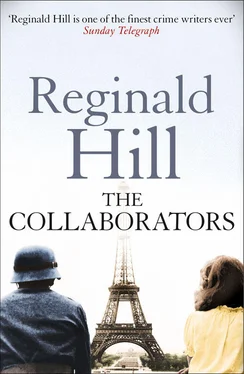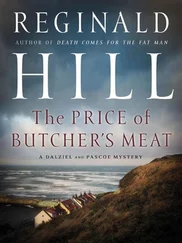By midday the stream was almost static, setting up a long ribbon of heat-haze which outshimmered the gentler vibration above the ripening corn. Cars broke down under the strain and were quickly pushed into the ditch by those behind. Janine Simonian sat in her tiny Renault, terrified that this would soon be her fate. The engine was coughing like a sick man. She glanced at her two small children and tried to smile reassuringly. Then she returned her gaze to the dark-green truck ahead of her and concentrated on its tailboard, as if by will alone she hoped to create a linkage and be towed along in its wake.
Her lips moved in prayer. She’d done a lot of praying in the past few weeks.
So far it hadn’t worked at all.
There were four of the green trucks, still nose to tail as they had been since they set off from Fresnes Prison that morning.
In the first of them, unbeknown to Janine, sat her cousin, Michel Boucher. It was to his sister, Mireille, living in what seemed like the pastoral safety of the Ain region east of Lyon, that she was fleeing.
Boucher himself wasn’t fleeing anywhere, at least not by choice. And given the choice, he wouldn’t have thought of his sister, whom he hadn’t seen for nearly ten years. Besides, he hated the countryside.
Paris was the only place to be, in or out of gaol. Paris was his family, more than his sister and her peasant husband, certainly more than his cousin and her fearful mother. Bloody shop-keepers, they deserved to be robbed. And bloody warders, they needed some sense kicked into them.
Rattling his handcuffs behind him he said, ‘Hey, Monsieur Chauvet, do we have to have these things on? If them Stukas come, we’re sitting ducks.’
‘Shut up,’ commanded the warder without much conviction.
He was thinking of his family. They were stuck back there in Paris with the Boche at the gate while he was sitting in a truck conveying a gang of evacuated criminals south to safety. Something was wrong somewhere!
‘Know what this lot looks like?’ said another prisoner, a thin bespectacled man called Pajou. ‘A military convoy, that’s what. Just the kind of target them Stukas like. We’d be better off walking.’
‘You think your mates would be able to spot you at a couple of hundred miles an hour, Pajou?’ said the warder viciously. ‘No, my lad, you’ll be getting your Iron Cross posthumously if the bastards come!’
Pajou looked indignant. He’d been a charge hand at a munition factory near Metz. A year before, he had been sentenced to eight years for passing information about production schedules to German Military Intelligence. He had always loudly protested his innocence.
Before he could do so now, Boucher rattled his cuffs again and pleaded, ‘Come on, chief, you know it’s not right. If them Stukas come, it’s like we were staked out for execution.’
The warder, Chauvet, opened his mouth, but before he could speak, Pajou cried, ‘Listen! Look!’
Looking and listening were almost the same thing. Two black spots expanded like ink stains in the clear blue sky in a crescendo of screaming engines; then came the hammering of guns, the blossoming of explosions; and the long straight river of refugees fountained sideways into the poplar-lined ditches as the Stukas ran a blade of burning metal along the narrow road.
Boucher saw bullets ripping into the truck behind as he dived over the side. With no protection from his arms, he fell awkwardly, crashing down on one shoulder and rolling over and over till a poplar trunk soaked up his impetus.
‘Jesus Christ!’ he groaned as he lay there half-stunned. All around were the cries and moans of the terror-stricken and the wounded. How long he lay there he did not know, but it was that other sound, heard only once but now so familiar, that roused him. The Stukas were returning.
Staggering to his feet he plunged deeper into the field which lay beyond the roadside ditch. What crop it held he could not say. He was no countryman to know the difference between corn and barley, wheat and rye. But the sea of green and gold stems gave at least the illusion of protection as the Stukas passed.
Rising again, he found he was looking into Pajou’s pallid face. His spectacles were awry and one lens was cracked but an elastic band behind his head had kept them in place.
‘You all right, Miche?’
‘Yeah.’
‘What now?’
Why the man should offer him the leadership, Boucher did not know. He hardly knew Pajou and didn’t care for what he did know. Robbing the rich was one thing, selling your country another.
But people often deferred to him, probably simply because of his appearance. Over six foot tall, Titian-haired, eagle-nosed, he had the kind of piratical good looks which promised excitement and adventure. Also he was known from his name as Miche the Butcher, and if his easy-going manner made anyone doubt his capacity for violence, his sheer bulk generally inhibited them from testing it.
But Pajou’s question was a good one. What now? Run till they found a friendly blacksmith?
‘Hold on,’ said Boucher.
An image from his mad flight from the road had returned to him.
He retraced his steps to the roadside. Lying in the ditch just as he had remembered was the warder. There was no sign of a bullet wound, but his head was split open. Despite the freedom of his arms, he must have fallen even more awkwardly than Boucher.
The bloody head moved, the eyes opened and registered Boucher, who raised his booted foot threateningly. With a groan, Chauvet closed his eyes and his head fell back.
Squatting down with his back to the body, Boucher undid the man’s belt, then fumbled along it till he came to the chain which held his ring of keys. It slid off easily.
Standing up, he found that Pajou had joined him.
Looking down at the unconscious warder, he said admiringly, ‘Did you do that? Christ, you can handle yourself, can’t you, Miche?’
‘Let’s go,’ said Boucher shortly.
They set off once more into the green-gold sea, sinking into it like lovers after a couple of hundred metres.
It took ten minutes working back to back to unlock the cuffs from Pajou’s wrists, two seconds then to release Boucher.
Released, Pajou was a different man, confident of purpose.
‘Come on,’ he said, massaging his wrists.
‘Where, for Christ’s sake?’
‘Back to Paris, of course,’ said Pajou in surprise. ‘With the Germans in Paris, the war’s over.’
‘Tell that to them back there,’ said Boucher curtly gesturing towards the road.
‘They should’ve stayed at home,’ said Pajou. ‘There’ll be no fighting in Paris, you’ll see. It’ll be an open city. Once the peace starts, it’ll be a German city.’
Boucher considered the idea. He didn’t much like it.
‘All the more reason to be somewhere else,’ he growled.
‘You think so?’ said Pajou. ‘Me, I think there’ll be work to do, money to be made. Stick with me, Miche. The Abwehr will be recruiting likely lads with the right qualities, and they’re bloody generous, believe me!’
‘So you did work for them,’ said Boucher in disgust. ‘All that crap about being framed! I should’ve known.’
‘It didn’t harm anybody,’ said Pajou. ‘If anything, it probably saved a few lives. The Krauts were coming anyway. Whatever helped them get things over with quickest was best for us, I say. It’s them silly military bastards who went on about the Maginot Line that should’ve been locked up. We must’ve been mad to pay any heed to a pathetic old fart like Pétain . . . Jesus Christ!’
Boucher had seized him by his shirt front and lifted him up till they were eye to eye.
‘Careful what you say about the Marshal, friend,’ he growled. ‘He’s the greatest man in France, mebbe the greatest since Napoleon, and I’ll pull the tongue out of anyone who says different.’
Читать дальше












